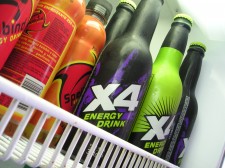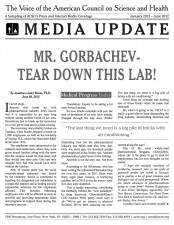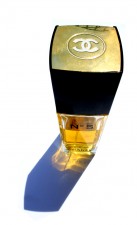A potential breakthrough in treatment for venous leg ulcers has given us a promising look into the future. The new treatment is called spray-on-skin, and a recent study in The Lancet finds that it accelerates healing time as well as greatly reducing the size of the ulcer.
Search results
 With the growing popularity of energy drinks such as Pepsi s AMP, Living Essentials 5-Hour Energy and Monster Beverage s Monster Energy Drink, the caffeine content in such beverages continues to be a pressing issue.
With the growing popularity of energy drinks such as Pepsi s AMP, Living Essentials 5-Hour Energy and Monster Beverage s Monster Energy Drink, the caffeine content in such beverages continues to be a pressing issue.

The Voice of the American Council on Science and Health (ACSH) presents a sampling of its press and internet media coverage from January 2012 June 2012.
 The iconic 90-year-old perfume Chanel No.5 is one of the most well known perfumes worldwide. Now, this world-famous perfume along with other famous brands such as Shalimar may soon be banned by the European Union after scientists found that some of the ingredients may cause allergies.
The iconic 90-year-old perfume Chanel No.5 is one of the most well known perfumes worldwide. Now, this world-famous perfume along with other famous brands such as Shalimar may soon be banned by the European Union after scientists found that some of the ingredients may cause allergies.
With countless practitioners and other public health officials endorsing mandatory flu vaccines for health care workers, it is hard to believe that there is so much resistance.
Dr. Evan S. Levine writes in the New York Post that Dr. Steven Safyer, the Montefiore Medical Center president and CEO, told his staff in a Jan. 13 letter that that fewer than 50 percent of our associates have been vaccinated. This means the majority of our associates are at risk for illness.
Too many workers are making the wrong choice, at risk to themselves and their patients, he writes.
Contrary to long-standing belief, a new study published in the British Medical Journal found that higher consumption of eggs up to one egg per day is not associated with increased risk of coronary heart disease or stroke. In fact, eggs are an inexpensive and low calorie source of other nutrients including minerals, proteins and unsaturated fatty acids, which could actually lower the risk of cardiovascular disease.
Last December, the French senate passed a law that would become effective in July of 2015 banning the use of tubes containing diethylhexyl-phthalate (DEHP) from pediatric, neonatal and maternity wards. The ban may be challenged by the European Food and Safety Authority if they find that it is not scientifically warranted.
Last week, the Canadian government reaffirmed the safe use of bisphenol A (BPA) in food packaging, upholding its 2008 stance that dietary exposure to the chemical does not pose a health risk to the general population, including newborns and young children.
At the American Council on Science and Health, our goal is to increase people s awareness of actual threats to their health smoking, for example without their having to spend time worrying about things that pose no danger at all. Unfortunately, the goals of some politicians, the media, and certain activist groups can be somewhat different they frequently aim to create a sensation and gain publicity without much regard for actual scientific evidence. This annual list of the top 10 health scares aims to quell fears by discussing the real evidence about these unscientific scares.
A new study published in the journal Health Affairs found that the rate of Caesarean deliveries varied widely across hospitals and regions of the United States, from 7 percent of all births at the hospital with the lowest rate, to 70 percent of all births at the hospital with the highest rate.
The latest food scare du jour involves an online petition by moms Lisa Leake and Vani Hari of North Carolina asking Kraft to remove Yellow Dyes No. 5 and 6 from their mac and cheese.
In a move that borders on hilarious (unless you happen to live there, in which case it's anything but) Nevada state Sen. Tick Segerblom is pushing for a law that he believes will address the growing problem of opiate addiction. The new measure would permit patients who become addicted to painkillers to sue the doctors who prescribed the medications, as well as the manufacturers that made the drug.
The Centers for Disease Control and Prevention on Wednesday released a study estimating that 1 in 50 U.S. schoolchildren have autism, surpassing another estimate that 1 in 88 kids do.
Pharmaceutical companies have long argued that the incentive for creating new drugs is that they retain exclusive rights to sell their inventions for a period of time that s long enough to recover the cost of their investment, and then make a profit off the venture.
http://www.youtube.com/watch?v=uoMuq4V3EkQ
Negative messages about children s vaccines are more likely to be spread on Twitter than positive messages, according to research led by Marcel Salathé, an assistant professor of biology at Penn State University.
In the United States, 66 percent of adults are categorized as either overweight or obese a number is three times what it was in 1980. Elevated body mass index, an estimate of body fatness based on height and weight, has long been considered a risk factor for coronary heart disease, stroke, and cancers of the large intestine, kidney, uterus, and breast in postmenopausal women. Furthermore, 20 percent of adults aged 20 years or older have metabolic syndrome, defined by a combination of obesity, hypertension, dyslipidemia, and insulin resistance.
The question of whether or not students should be screened using an electrocardiogram to detect cardiac problems before engaging in sports has come up again. Although the European Society of Cardiology advocates for the use of an ECG, the American Heart Association recommends only taking a history and doing a physical examination without an ECG. [...]
The post ECG as a screening tool for athletes? appeared first on Health & Science Dispatch.
 It s called the cinnamon challenge a dare popularized by YouTube, in which the hapless victim tries to swallow a spoonful of ground cinnamon in a minute without liquids.
It s called the cinnamon challenge a dare popularized by YouTube, in which the hapless victim tries to swallow a spoonful of ground cinnamon in a minute without liquids.
Getting healthy isn’t always easy. Time restrictions and a lack of motivation often prevent Americans from being as fit as they could be. In fact, according to Arnt Erik Tjonna, from the K.G. Jebsen Center for Exercise in Medicine (JCEM), only about 15 to 30 percent of Americans exercise at the suggested rate of 30 [...]
The post Health hacks – fast and easy exercises that can improve health appeared first on Health & Science Dispatch.
In today’s “so what?” news, a UCLA study found that a 60-year old morning sickness drug that is pretty close to useless (and was once withdrawn due to birth defect concerns) is significantly linked to an increase in adverse outcomes among newborns, and with problems in mothers as well. A more fundamental question is why [...]
The post Bendectin: A schizophrenic drug that isn’t for schizophrenia appeared first on Health & Science Dispatch.
You may want to think about hopping into bed a little earlier tonight. In a column published in The New York Times today, Jane E. Brody discusses the risks associated with not getting enough sleep. She argues that most people actually need seven or eight hours of sleep to function and that sleep deprivation can [...]
The post How much sleep do you really need? Probably more than you’re getting appeared first on Health & Science Dispatch.
Will wonders never cease? The British newspaper The Guardian has reported the sobering news that crop yields will be inadequate to feed the burgeoning world population by 2050. But that’s not the amazing thing — that news has been around for a while. No, what’s both surprising and encouraging is that the British environment minister, [...]
The post Some sanity on genetically engineered foods appeared first on Health & Science Dispatch.
If you went by the headlines, you’d be sure that the widespread obesity problem is due to consumption of too much sugar — especially from sodas and other sweetened beverages. But according to a recent report from the Centers for Disease Control and Prevention, you’d be wrong. Examination of data on adults’ (20-60+ years) intake [...]
The post Too much sugar—but not just from soda appeared first on Health & Science Dispatch.
The approach to fighting obesity using appetite suppressants came to a screeching halt in 1997, when Wyeth, the maker of the wildly successful diet drug phen-fen, was forced to withdraw the drug after the FDA received numerous reports of heart valve problems and also some cases of pulmonary hypertension, a rare but often fatal lung [...]
The post The diet drug Qsymia is safe and effective-as expected appeared first on Health & Science Dispatch.
 A new study conducted by the National Toxicology Program, an agency that is part of the Department of Health and Human Services, has put yet another dietary supplement in the spotlight.
A new study conducted by the National Toxicology Program, an agency that is part of the Department of Health and Human Services, has put yet another dietary supplement in the spotlight.
Pagination
ACSH relies on donors like you. If you enjoy our work, please contribute.
Make your tax-deductible gift today!


